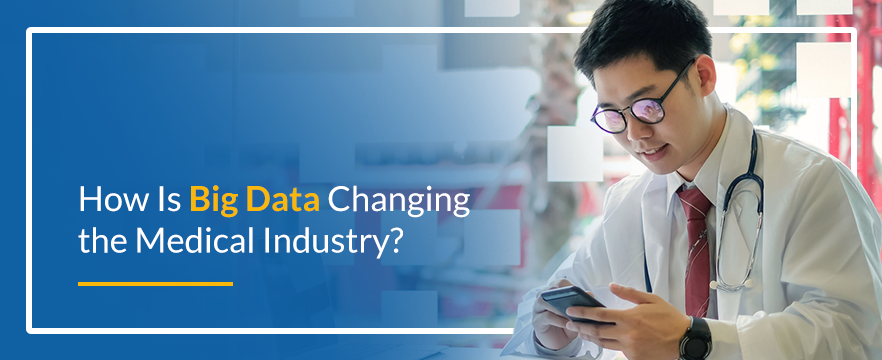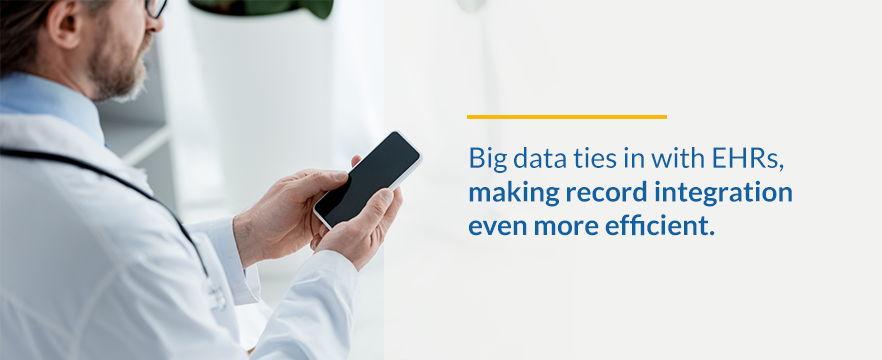How Does Big Data Help the Medical Industry
Feb 13, 2020 | Jonathan Maisel
The term “big data” appears self-explanatory at first glance, but it’s more complicated than many realize. Big data refers to the collection and evaluation of extensive data sets that traditional tools can’t easily analyze. As such, neural networks, complex algorithms and machine learning must process these massive repositories of information.
Big data operates on the concept that the more knowledge we can glean from any piece or body of information, the easier it will be to deliver insights that drive improvements and innovation. In the medical industry, healthcare applications increasingly use big data to reduce costs and improve how patients receive care.
What Is Big Data, and How Does It Relate to Health Care?
Big data addresses several sweeping changes affecting the health care industry. Below are three of the problems big data can help solve, turning significant challenges into crucial opportunities to provide better care.
1. Growing Volume of Health Care Big Data
After the Health Information Technology for Economic and Clinical Health (HITECH) Act of 2009 provided financial incentives for electronic health record (EHR) adoption, the use of EHRs has quickly become the default for most clinicians and organizations. This transition has inundated the industry with health data that was never centrally accessible before. Additionally, the growing use of consumer technology like wearables and mobile apps keeps adding even more relevant data to the mix.
Big data in health tech allows health organizations to interpret, analyze and take advantage of these untapped sources of information.
2. Skyrocketing Health Care Costs
Health care costs have consistently grown at a rapid pace since the turn of the century. Currently, these expenses amount to almost 18% of our GDP, totaling about $3.6 trillion. This vast figure is due in part to changing lifestyles and a variety of new government regulations, but the fact remains that health entities must do everything they can to slow the rise in costs. By conducting cost-benefit analyses, big data helps health care organizations find actionable ways to maximize efficiency and overall population health.
3. Demand for Personalized Care
Primed by sweeping developments in the retail and customer service industries, consumers demand and expect a highly convenient, individualized experience when receiving health care services. This development has led to a new model of care aimed at improving quality, while increasing engagement and retention. Big data in health care technology allows providers to act almost like the personalized product recommendations you find on big retail websites, offering patients the most relevant customized information and options for care.

What Are Some Examples of Big Data Being Used in the Health Care Industry?
How does health care benefit from big data? These three applications are just a few examples of its use.
1. Early Detection
Big data systems can look at the information of hundreds of thousands of patients to pick out patterns and indicators of particular diseases. This technology can lead to much faster, more accurate diagnoses, improving the quality of care. For conditions like cancer, early detection significantly improves outcomes.
2. Improving Population Health
While public health systems explore the ways society can produce healthier individuals, the study of population health involves examining patterns in conditions that affect a variety of specific demographics. Without sets of data that provide a large enough sample of populations, it’s nearly impossible to predict these trends with any real accuracy.
3. Enhancing Research and Development
Pharmaceutical and medical R&D faces several challenges that big data can reduce or eliminate. It can produce predictive models of how drugs will work with biological processes, and even helps identify the most appropriate patients for participation in clinical trials. Big data systems can also monitor trials in real-time to receive immediate notification of adverse events, reducing delays and maximizing safety.
How Is Big Data Changing Health Care?
While the health care sector continues to grow at a rapid pace, it must keep up with rising demands regarding patient care quality and innovations in technology. Analysts expect big data to grow much faster in health care than in other sectors like finance or manufacturing. In fact, one report from the International Data Corporation projects health care data’s compound annual growth rate to be 36% through 2025.
Some of the most significant changes big data will bring to health care involve administrative processes that have remained the same for decades. Hospitals that historically over- or under-schedule staff members can use big data to predict admission rates, allowing them to staff more accurately. Efficiencies of this nature will enable organizations to maximize the return on their investments and effectively allocate resources.
Big data ties in with EHRs, making record integration even more efficient. In addition, big data can help patch vulnerability to data breaches. As a result, data management systems can help organizations identify threats or errors regarding patient data, keeping that information away from malicious actors.
What Big Data Changes Will Benefit Physicians?
In addition to improving efficiencies and saving health care organizations money, the adoption of big data has significant benefits for clinicians. As physicians’ priority is their patients, the most central benefit is the availability of more data to inform clinical decisions. Big data tools not only make vast amounts of information available to clinicians, but they also analyze the data on a scale that humans cannot achieve. Someday in the not-too-distant future, doctors will be able to feed X-rays, lab tests and other information into a system and have it provide highly accurate suggestions on the diagnosis and best course of treatment.
Big data will also allow physicians to make better use of all the information generated through the Internet of Things (IOT). Real-time patient monitoring will become more common, as smartwatches and other wearable health tech devices provide a steady stream of information outside of a clinical setting. These tools will alert a patient’s care team to notable changes, and will also contribute to population health information physicians ultimately use to guide their treatment decisions.

Big Data and Medical Transcription Services
Big data is here to stay, and it allows physicians to deliver better care based on individualized charts compared to the information of thousands of other patients. However, the manual data entry burden inherent in using an EHR use still holds doctors back from achieving maximum efficiency and quality of patient interactions. To reduce burnout and enhance productivity, private practices, hospitals and other health care organizations are still turning to medical transcription to solve physicians’ data entry burden.
Medical transcription allows physicians to dictate their notes naturally, which preserves the patient narrative while reducing time spent typing and clicking in the EHR. ZyDoc’s medical transcription services are 61% faster than manually entering data, and with a guaranteed documentation accuracy rate of up to 99.6%, physicians can trust that their dictated notes are also accurate. To learn more about how medical transcription can enhance physician use of big data, call 1-800-546-5633 or view our plans and pricing online.
